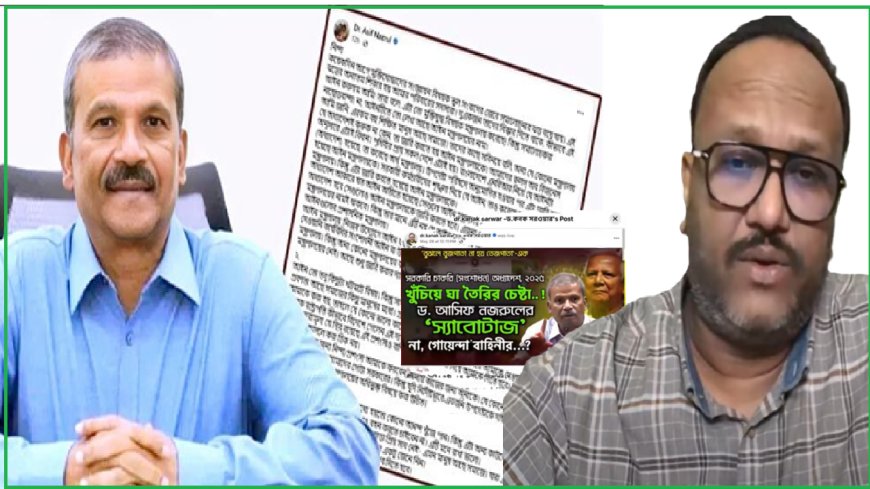Faith and Friction: Legal Adviser’s Facebook Post Sparks Online Clash

Professor Dr. Asif Nazrul, Legal Affairs Adviser to the Interim Government of Bangladesh, stirred widespread debate on social media following a Facebook post titled “Ninda” (Condemnation) made on Wednesday night, June 11. In the post, he reflected on recent public criticism, urging: “Before condemning anyone, try to understand the context. We all will be held accountable one day.”
This statement prompted a pointed response from journalist and online activist Dr. Kanak Sarwar, who cautioned against the use of religious references to silence dissent. “Allah is for everyone. Don’t threaten us by invoking Allah. Quoting the Prophet and Allah to shut down critics is a very old tactic. In Bangladesh, this religious cover is often used to conceal crimes,” said Dr. Sarwar.
The controversy stems from a wave of criticism surrounding recent legislative actions, including a contentious ordinance involving the definition of freedom fighters, which many mistakenly attributed to the Ministry of Law. Dr. Nazrul’s Facebook post was met with mixed reactions and quickly spread across news portals and social media platforms.
Dr. Sarwar, in a YouTube livestream titled “Midnight Facebook Fury! Law Adviser 'Triggered' Without Reason” posted on Thursday, labeled Dr. Nazrul’s post an emotional outburst. He explained that his criticism stemmed from Dr. Nazrul’s statement, “We all will be held accountable one day.”
In his video, Dr. Sarwar elaborated on the government's Annual Performance Agreement, noting that before passing any law or ordinance, the Ministry of Law is tasked with vetting the proposal for constitutional alignment, human rights compatibility, and conflict with existing laws. He said, “This is why I criticized the amendment to the Public Service Ordinance. The ordinance was issued on May 25, just a day after resolving Dr. Yunus’s resignation issue on May 24. It caused unrest among the 1.8 million government employees, who were already demonstrating inside the Secretariat.”
Dr. Sarwar argued that issuing such an ordinance at a time of political transition fell outside the interim government's jurisdiction and that the ordinance conflicted with the constitution. “Even on June 3, when aggrieved officials met with Dr. Nazrul, he reportedly admitted that the law could be misused in certain cases.”
Referring to another controversial directive related to freedom fighters, Dr. Sarwar said, “The Law Ministry is now preoccupied with questionable ordinances. But when we talk about them, we're told—‘Allah is watching, and we’ll all be held accountable.’ Yet, we’ve seen how certain individuals were spared or not arrested due to intervention from this ministry. One murder case was withdrawn within ten days. Judges who unjustly sentenced Begum Khaleda Zia are now receiving promotions. This shouldn’t be happening.”
Addressing Dr. Nazrul directly, he asked, “If Allah is to judge me, will He not judge you too?”
The full text of Dr. Asif Nazrul’s original Facebook post reads:
Ninda (Condemnation)
“A few days ago, due to an erroneous report regarding the definition of freedom fighters, a storm of criticism erupted. My family members became targets—people began to curse them, asking how I could have made such a law! They said: ‘But this law was made by the Ministry of Liberation War Affairs!’ Still, the critics persisted, arguing: ‘But the ordinance mentions the Ministry of Law.’
I am aware that many educated people in society may not understand this. So I humbly say: No matter which ministry initiates an ordinance, it is always issued by the Ministry of Law. This is mandated by our Rules of Business. The same applies in most countries around the world.
The recent ordinance concerning the NBR was made by the Ministry of Finance, but it was issued by the Ministry of Law after being approved by the Advisory Council. The disciplinary law for public servants was also made by the Ministry of Public Administration, yet it too had to be issued by the Ministry of Law.
Every ordinance in the past was issued by the Ministry of Law. The same will happen in the future. That is why the Ministry of Law appears on the first page of the Gazette. But this does not mean the law was made by this ministry or that it is the administrative ministry responsible.
The Ministry of Law only drafts laws for matters within its jurisdiction—such as the amendment to the Civil Procedure Code or legislation on appointing judges to higher courts. But for laws related to other ministries, it only has the responsibility to formally issue the ordinance—not to create it.
Law is a complex subject. Yet I find that some people criticize me even for simple matters.
If I am to be blamed for every action of the government, then why am I not praised for the good things as well?
If the former President left the country, and the blame is put on me instead of the Ministry of Home Affairs, then the credit for stable commodity prices should also be given to me instead of the Ministry of Commerce. But none of this is appropriate.
Praise or blame me for my work—others should be held accountable for theirs. The government bears collective responsibility, but if an adviser is singled out, it should be for matters under his jurisdiction.
Those who criticize and slander may derive satisfaction from it, but they may also cause harm that they would not want to endure themselves. This is something to consider.
I know there are people in society who, as the poet said, ‘have no dearer passion than dimming another’s smile.’
To those who are not like that, I request—before condemning anyone, try to understand. Allah is watching. We all will be held accountable one day.”
The ongoing exchange highlights the rising tensions between government advisers and independent commentators during Bangladesh’s transitional period. While public officials argue for understanding and procedural accuracy, critics continue to scrutinize the ethics, transparency, and timing of recent legislative actions.









































































































































































































